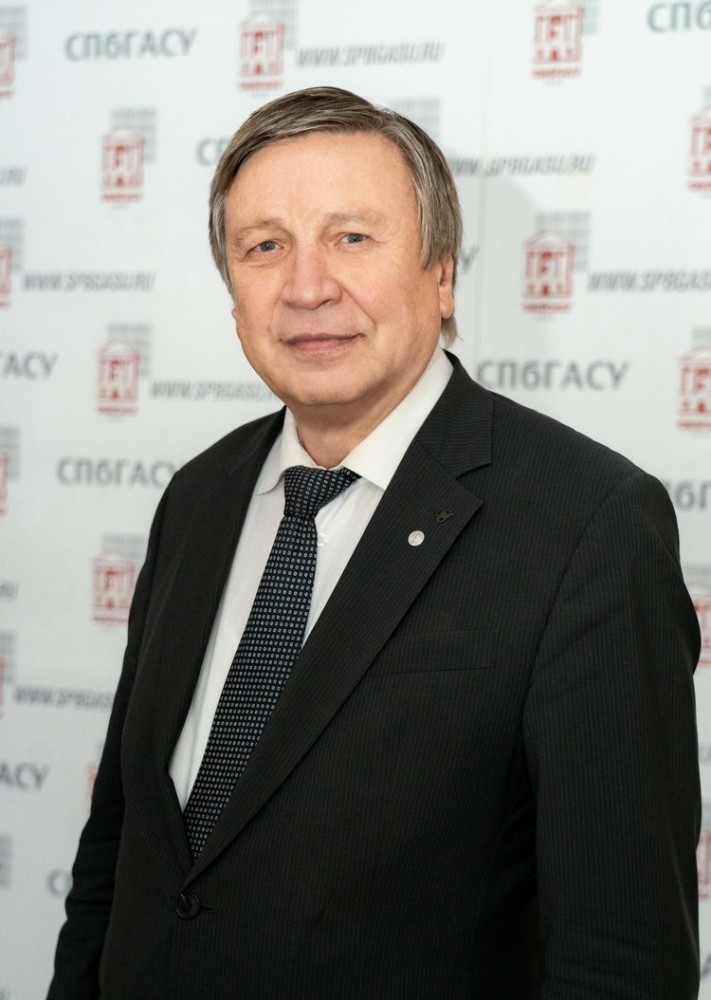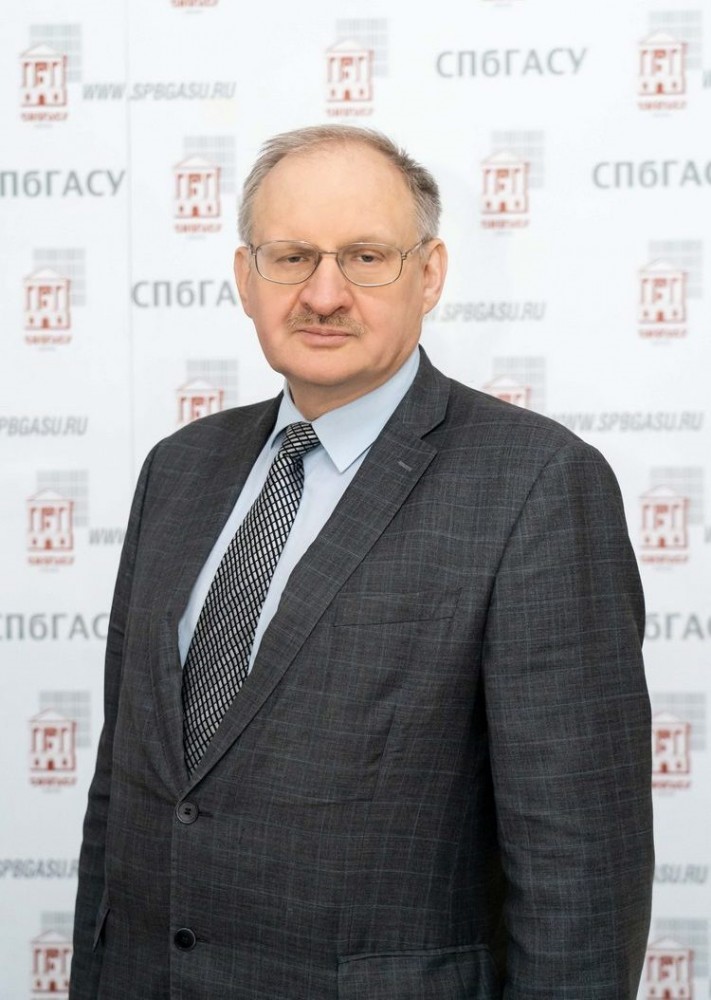 Lidya Kondratyeva
Lidya Kondratyeva
Lidya Kondratyeva, professor at the Department of Geotechnics, has been working at SPbGASU since 2004. She teaches "Foundations engineering" and "Finite element method in geotechnics".
Fr om 2004 to 2006, Lidya Nikitovna was SPbGASU Vice-Rector for Educational Work, fr om 2008 to 2015 she was the Head of the Department of Structural Mechanics, then became a professor at the Department of Geotechnics. From 2006 to 2014, she served as academic secretary of the University Academic Council.
 Dissertation Council “Structural Mechanics. Engineering structures, buildings and constructions” (2023) Bottom row: Elena Maslennikova, pensioner; Aleksandr Maslennikov, Visiting Professor at the Department of Structural Mechanics; Lidya Kondratyeva, Professor at the Department of Geotechnics; Vladimir Karpov, Visitng Professor at the Department of Computer Science. Top row: Vladimir Popov, Associate Professor at the Department of Reinforced Concrete and Masonry Constructions, academic secretary of the Dissertation Council; Mikhail Sukhoterin, Head of the Department of Higher Mathematics, State University of the Sea and River Fleet named after Admiral S. O. Makarov; Grigory Bely, Visiting Professor at the Department of Reinforced Concrete and Masonry Constructions; Valery Morozov, Professor at the Department of Reinforced Concrete and Masonry Constructions, Chairman of the Dissertation Council; Vyacheslav Belov, chief builder of the technical department of St Petersburg JSC "Atomenergoproekt"; Yury Pukharenko, Head of the Department of Technology of Construction Materials and Metrology; Boris Labudin, Professor at the Department of Engineering Structures, Architecture and Graphics of the Northern (Arctic) Federal University named after M. V. Lomonosov
Dissertation Council “Structural Mechanics. Engineering structures, buildings and constructions” (2023) Bottom row: Elena Maslennikova, pensioner; Aleksandr Maslennikov, Visiting Professor at the Department of Structural Mechanics; Lidya Kondratyeva, Professor at the Department of Geotechnics; Vladimir Karpov, Visitng Professor at the Department of Computer Science. Top row: Vladimir Popov, Associate Professor at the Department of Reinforced Concrete and Masonry Constructions, academic secretary of the Dissertation Council; Mikhail Sukhoterin, Head of the Department of Higher Mathematics, State University of the Sea and River Fleet named after Admiral S. O. Makarov; Grigory Bely, Visiting Professor at the Department of Reinforced Concrete and Masonry Constructions; Valery Morozov, Professor at the Department of Reinforced Concrete and Masonry Constructions, Chairman of the Dissertation Council; Vyacheslav Belov, chief builder of the technical department of St Petersburg JSC "Atomenergoproekt"; Yury Pukharenko, Head of the Department of Technology of Construction Materials and Metrology; Boris Labudin, Professor at the Department of Engineering Structures, Architecture and Graphics of the Northern (Arctic) Federal University named after M. V. Lomonosov
Lidya Kondratyeva is a member of two dissertation councils: the first - on structural mechanics, engineering structures, buildings and constructions, the second - on foundations engineering and underground structures. For a long time she worked in the dissertation council on architecture. She was the academic secretary of the first of the three named councils.
Professor Kondratyeva developed a methodology for studying the stress-strain state of shallow folded shells under static and dynamic loads, derived formulas for taking into account various factors when calculating stability for shallow three-layer shells with small surface fractures.
She is the author of more than 70 published scientific and educational works.
For conscientious work, she was several times awarded with diplomas of the university. In 2005, she received a gratitude letter from the Vice-Governor of St Petersburg for many years of conscientious work and personal contribution to the development of the city's construction industry, and was awarded an Honorary Diploma from the Ministry of Education and Science of the Russian Federation. In 2012, she was awarded the title of "Honorary Worker of Higher Professional Education of the Russian Federation".
We asked Lidya Nikitovna to tell us about her scientific work and what has inspired her on the professional path.
– At the placement of graduates of the Khabarovsk Polytechnic Institute in 1979, the dean of the Faculty of Mechanics of the Blagoveshchensk Agricultural Institute invited young professionals to teach special disciplines at the opening faculty of construction. I had the opportunity to teach structural mechanics to the first set of students. It was very difficult, and then the conviction was formed - in order to teach, you yourself must constantly study, improve your skills.
.jpg) Boris Mikhailov with graduate students (1988)
Boris Mikhailov with graduate students (1988)
In 1985, I entered the extra-mural PhD studies at the Leningrad Civil Engineering Institute (now SPbGASU). Professor Aleksandr Matveyevich Maslennikov became my first scientific supervisor. He took the risk of accepting me as a PhD student, for which I am very grateful to him. A good start is half the battle! At that time, Aleksandr Matveevich was the head of the Department of Structural Mechanics and Vice-Rector for Research, so he suggested contacting a young promising scientist Boris Kuzmich Mikhailov. Under his guidance, in 1989, I successfully defended my PhD, and in 2001, my doctoral dissertation.
– What do you remember about your mentor?
– Boris Kuzmich Mikhailov was a Professor, DSc in Engineering, founder of the scientific school "Theory of calculation of shells and plates with discontinuous parameters". All of his PhD students successfully defended their theses, because he was a brilliant teacher, mathematician and civil engineer. He graduated not only from LISI, but also from the Faculty of Mathematics of the Pedagogical Institute. From 1982 to 1990, he was the only supervisor who conducted weekly seminars for his PhD students and students from other departments involved in analytical calculations of thin-walled structures. Boris Kuzmich had a deep knowledge of theoretical and structural mechanics, the theory of shells and the analytical apparatus of discontinuous functions, and he easily deduced formulas for us on the blackboard, comparing mathematical calculations with classical music. At the seminars, PhD students made presentations, which we then vigorously discussed.
Of course, there were difficulties. The first was the distance between our cities of about 8 thousand kilometers, the difference in time was 6 hours. The second was the search for housing in a city wh ere there were no relatives, and dormitories were not provided to extra-mural students. Thirdly, it was difficult to study in the distant mode, teach and raise two children. The fourth was the complex technical discipline that required in-depth mathematical training. The fifth was the misunderstanding by some scientists of the need for women to engage in technical sciences. I sometimes heard the phrase that women had nothing to do in the dissertation doctoral technical council.
– How did you overcome the difficulties?
– To overcome difficulties we were helped with the supervisor's confidence in the success of his PhD students, his assistance in understanding complex issues, personal conversations and seminars of Boris Kuzmich, at which we listened to the lectures of our supervisor, discussed difficulties in solving the tasks set. School and institute training also helped: I had capable, caring teachers and lecturers. In addition, for three years I studied at the club of young pilots, wh ere real men, aviators, taught classes in aerodynamics, piloting and other things. We dreamed of becoming astronauts, so we had discipline, theoretical and physical training.
I think that the meeting with the brilliant scientific leader Boris Kuzmich Mikhailov, my capacity for research, and the dream of becoming an astronaut helped me achieve the high goal of defending my doctoral dissertation and continuing to do science to the present.
A new flow of energy came from working with Professor Rashid Abdullovich Mangushev, who in 2015 invited me to the Department of Geotechnics. Now I belong to the scientific school "Designs and technologies of foundations and underground structures", which is headed by Professor Mangushev, DSc in Engineering, Corresponding Member of the RAACS, Honored Worker of Higher Education, a brilliant organizer and teacher. I got into a team of creative people, plunged into the study of new theoretical and applied disciplines.
Today, I am inspired to new achievements in science by the Head of the Department of Geotechnics Anatoly Ivanovich Osokin, together with the staff of the Department and PhD students who make new discoveries, develop their own software systems for calculating bases and foundations instead of imported ones.
– Do you pass on your knowledge and experience to the younger generation of researchers?
– Under my supervision, Irina Povarova and Nguyen Hai Hoan (Vietnam) defended their PhD dissertations in Structural Mechanics. In the discipline "Foundations engineering and underground structures", under my supervision, in 2021, a graduate student from Vietnam Le Van Chong defended his thesis on the topic "The bearing capacity of piles made in the ground, based on the results of static field tests."
I am currently the supervisor of three PhD students from Russia, Syria and Bolivia. We deal with topical issues dictated by the need to develop underground space in cramped urban conditions: we study the relationship between the deformation of foundations and the rheological properties of soils, the mutual influence of deformations of neighboring buildings during phased construction, the effect of lime-containing additives in the reconstruction of foundations.
Further plans are to continue educational, training and scientific work.
, основатель научной школы «Теория расчёта оболочек и пластин с разрывными параметрами».jpg)


, основатель научной школы «Теория расчёта оболочек и пластин с разрывными параметрами».jpg)

